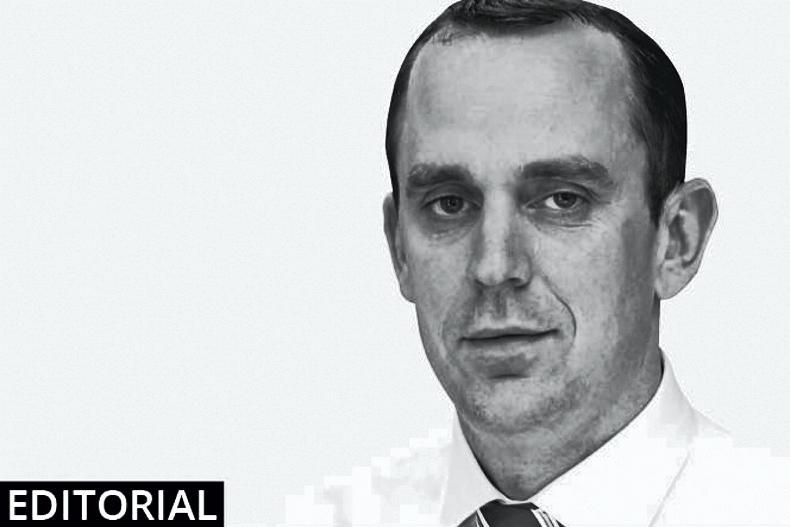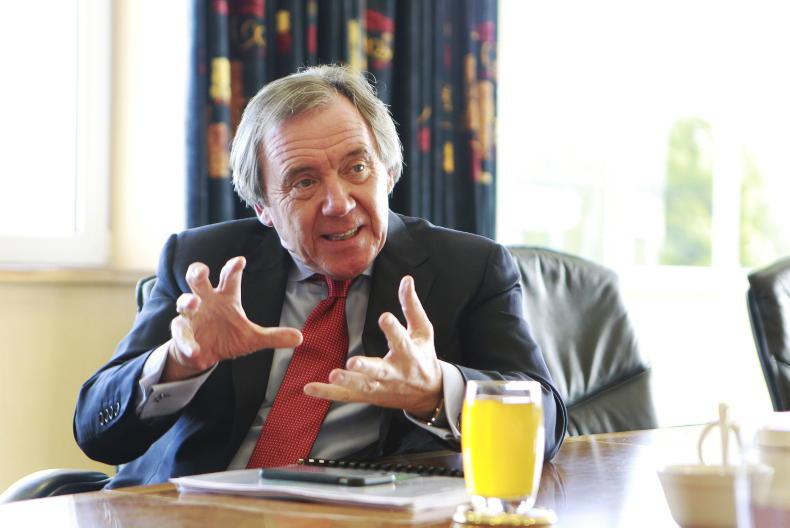It has been a tough week for Irish farmers.
One that was bookended by Taoiseach Leo Varadkar announcing that he was eating less meat on health and environmental grounds and a report commissioned by The Lancet medical journal warning that unless we cut beef consumption to the equivalent of a bite of a hamburger per day, the planet is heading towards environmental destruction.
Both statements need to be considered in the context that, despite having a population of just 4.7 million, Ireland, through its sustainable grass-based model, produces enough beef and dairy products to feed the equivalent of 35 million Europeans.

An Taoiseach Leo Varadkar this week said he was reducing his meat intake on environmental and health grounds. \ Donal O'Leary
Portrayal
However, instead of applauding our ability to contribute to global food production, some would rather portray our grass-based livestock production model as a blight on our environment – even though, albeit buried deep in the report, there is an acknowledgement of the important role that pasture-based systems will play in the future production of beef and dairy products.
Farmers can have little argument with a medical journal such as The Lancet giving recommendations on dietary habits.
However, the broad sweeping statements in the report of the EAT-Lancet Commission recommending radical changes to diets and forcing rapid changes in farming practices are not only extremely dangerous but counterproductive in trying to develop a sustainable global food supply chain.
It is a view shared by the Sustainable Food Trust, which states that due to a lack of agricultural understanding, some of the main recommendations in the report are incompatible with food production outcomes of truly sustainable farming systems.
The organisation, which set up to be a global voice for sustainable food and health, warns that prioritising reductions in beef and lamb consumption over poultry consumption would result in negative environmental and health outcomes.

Ireland, through its sustainable grass-based model, produces enough beef and dairy products to feed the equivalent of 35 million Europeans.
Fragility
Ultimately, the authors of the EAT-Lancet Commission report ignore the fragility of the global food production model. A model that according to the United Nations Food and Agricultural Organisation (FAO) has just 90 to 100 days of a food reserve in the event of disruption to future harvests.
At the same time, the FAO forecasts that by 2050 farmers will have to produce 60% more food to meet the demands of what will then be a global population of 9.6 billion.
By any measure, achieving such a level of growth will be a challenge.
The Intergovernmental Panel on Climate Change (IPCC) is recommending that up to 700m ha (80 times the size of Ireland) be converted from food production to energy crops in a bid to tackle climate change.
An estimated 12m ha per annum or 33,000ha per day is lost from agriculture due to desertification.
When considered against this backdrop, the scale of the challenge becomes even more stark.
Many commentators also chose to ignore the pressures that a growing middle class will place on global food production. The OECD forecasts that the size of the global middle class in 2030 will have swelled to 4.9 billion, almost tripling since 2009.
There is a clear correlation between economic growth and food consumption habits
There is a clear correlation between economic growth and food consumption habits. With increased wealth comes a shift from grain and seed-based diets towards a meat protein diet.
This in sharp contrast to the vision portrayed in the EAT-Lancet Commission report, which recommends that affluent western countries should reduce meat consumption by 90% and replace it with an 18-fold increase in consumption of dry beans, soy and nuts.
Challenges
So, will global food production rise to meet the challenges? Access to new technologies and ongoing increases in productivity will play a key role – but this must be aligned to an acceptance among farmers and policymakers that it cannot come at the expense of increasing the sector’s environmental footprint.
Farmers must produce more from a reducing land area and use fewer inputs, while producing greater yields. According to the FAO, such a transition is both possible and necessary through the sustainable intensification of agricultural production systems.
With one of the most sustainable dairy and beef production models in the world, Ireland’s grass-based farms have the potential to play a vital role in delivering the sustainable intensification goal set down by the FAO.
This is a point that was highlighted within the EAT-Lancet Commission report, albeit overlooked in most media coverage. The authors recommend that if meat and dairy become luxury products, production should be confined to pasture-based systems with arable land focused on growing plant-based food instead of providing grain for feedlot-type systems.
Blame
Despite this, the report has been used to once again point the finger of blame at the Irish livestock sector in the context of climate change.
In recent days, we have seen the headline recommendations being used by commentators to reinforce their argument that Ireland should reduce output from its livestock herd.
As the largest contributor to greenhouse gas emissions, it is understandable that the sector is put under the spotlight in the climate change debate.
However, the argument that the solution is to simply reduce output totally ignores the fact that our food production model is part of a global ecosystem.
Ireland reducing its use of fossil fuels in favour of renewables delivers a net dividend to the global problem of climate change.
However, Ireland reducing output from its sustainable grass-based beef and dairy production model, only for production to move to a part of the world where emissions levels are higher, actually has a negative global impact.

Any drop in beef production from Ireland would be offset by South American countries such as Brazil, where carbon emissions per kilo of beef are four times that in Ireland.
For example, any drop in beef production from Ireland would be offset by South American countries such as Brazil where carbon emissions per kilo of beef are four times that in Ireland – largely due to deforestation of the Amazon to allow for further herd expansion.
The key findings of the Global Forestry Resources Assessment published by the FAO showed that between 2010 and 2015, the annual loss of forests in Africa and South America amounted to 2.8m ha and 2m ha respectively.
In 2017, the world lost more than one football pitch of forest every second, the second-highest rate of deforestation since monitoring began in 2001.
As a major food exporter, Ireland cannot claim to be an impartial bystander when debating the future direction of global food production in the context of climate change. However, a point that is often ignored is the extent to which Irish farmers are prepared to engage on the issue.

Ireland’s grass-based farms have the potential to play a vital role in delivering the sustainable intensification of agricultural food production.
Through various initiatives supported by the Department of Agriculture, Bord Bia and the IFA, farmers are acutely aware of the need to produce more from less through the better utilisation of their inputs. They have already started on this journey. Through participation in the Bord Bia Origin Green programme, Irish beef farmers have reduced their carbon footprint by 5%.
However, Irish farmers cannot simply dismiss the positive contribution that changing consumer dietary trends can have in tackling climate change. Producing beef uses more land and emits more carbon per gram of protein than beans and therefore changes to diets will play a role in tackling environmental challenges.
However, the reality is that it will not reduce demand for Irish beef or dairy. The World Resources Institute predicts that between 2010 and 2050 global meat and dairy consumption is on course to increase by nearly 70%. Of course, pressure to change consumption patterns will influence this, but an underlying global demand will remain.
In the same vein, policymakers, environmental commentators and food scientists need to accept the dangers of making sweeping statements and giving prescriptive advice on a highly complex global food production model.
Calling for radical changes in diets and rapid changes in food production only discredits what is a legitimate argument around the need to influence diets in the battle against climate change. Ultimately, addressing climate change not only requires a balanced diet, it also requires a balanced debate.
Read more
Meat and dairy eaters have healthy hearts – global study
Lancet report strongly rebuffed by agri-industry
Leader of beef exporting country cannot advocate eating less meat - ICSA
It has been a tough week for Irish farmers.
One that was bookended by Taoiseach Leo Varadkar announcing that he was eating less meat on health and environmental grounds and a report commissioned by The Lancet medical journal warning that unless we cut beef consumption to the equivalent of a bite of a hamburger per day, the planet is heading towards environmental destruction.
Both statements need to be considered in the context that, despite having a population of just 4.7 million, Ireland, through its sustainable grass-based model, produces enough beef and dairy products to feed the equivalent of 35 million Europeans.

An Taoiseach Leo Varadkar this week said he was reducing his meat intake on environmental and health grounds. \ Donal O'Leary
Portrayal
However, instead of applauding our ability to contribute to global food production, some would rather portray our grass-based livestock production model as a blight on our environment – even though, albeit buried deep in the report, there is an acknowledgement of the important role that pasture-based systems will play in the future production of beef and dairy products.
Farmers can have little argument with a medical journal such as The Lancet giving recommendations on dietary habits.
However, the broad sweeping statements in the report of the EAT-Lancet Commission recommending radical changes to diets and forcing rapid changes in farming practices are not only extremely dangerous but counterproductive in trying to develop a sustainable global food supply chain.
It is a view shared by the Sustainable Food Trust, which states that due to a lack of agricultural understanding, some of the main recommendations in the report are incompatible with food production outcomes of truly sustainable farming systems.
The organisation, which set up to be a global voice for sustainable food and health, warns that prioritising reductions in beef and lamb consumption over poultry consumption would result in negative environmental and health outcomes.

Ireland, through its sustainable grass-based model, produces enough beef and dairy products to feed the equivalent of 35 million Europeans.
Fragility
Ultimately, the authors of the EAT-Lancet Commission report ignore the fragility of the global food production model. A model that according to the United Nations Food and Agricultural Organisation (FAO) has just 90 to 100 days of a food reserve in the event of disruption to future harvests.
At the same time, the FAO forecasts that by 2050 farmers will have to produce 60% more food to meet the demands of what will then be a global population of 9.6 billion.
By any measure, achieving such a level of growth will be a challenge.
The Intergovernmental Panel on Climate Change (IPCC) is recommending that up to 700m ha (80 times the size of Ireland) be converted from food production to energy crops in a bid to tackle climate change.
An estimated 12m ha per annum or 33,000ha per day is lost from agriculture due to desertification.
When considered against this backdrop, the scale of the challenge becomes even more stark.
Many commentators also chose to ignore the pressures that a growing middle class will place on global food production. The OECD forecasts that the size of the global middle class in 2030 will have swelled to 4.9 billion, almost tripling since 2009.
There is a clear correlation between economic growth and food consumption habits
There is a clear correlation between economic growth and food consumption habits. With increased wealth comes a shift from grain and seed-based diets towards a meat protein diet.
This in sharp contrast to the vision portrayed in the EAT-Lancet Commission report, which recommends that affluent western countries should reduce meat consumption by 90% and replace it with an 18-fold increase in consumption of dry beans, soy and nuts.
Challenges
So, will global food production rise to meet the challenges? Access to new technologies and ongoing increases in productivity will play a key role – but this must be aligned to an acceptance among farmers and policymakers that it cannot come at the expense of increasing the sector’s environmental footprint.
Farmers must produce more from a reducing land area and use fewer inputs, while producing greater yields. According to the FAO, such a transition is both possible and necessary through the sustainable intensification of agricultural production systems.
With one of the most sustainable dairy and beef production models in the world, Ireland’s grass-based farms have the potential to play a vital role in delivering the sustainable intensification goal set down by the FAO.
This is a point that was highlighted within the EAT-Lancet Commission report, albeit overlooked in most media coverage. The authors recommend that if meat and dairy become luxury products, production should be confined to pasture-based systems with arable land focused on growing plant-based food instead of providing grain for feedlot-type systems.
Blame
Despite this, the report has been used to once again point the finger of blame at the Irish livestock sector in the context of climate change.
In recent days, we have seen the headline recommendations being used by commentators to reinforce their argument that Ireland should reduce output from its livestock herd.
As the largest contributor to greenhouse gas emissions, it is understandable that the sector is put under the spotlight in the climate change debate.
However, the argument that the solution is to simply reduce output totally ignores the fact that our food production model is part of a global ecosystem.
Ireland reducing its use of fossil fuels in favour of renewables delivers a net dividend to the global problem of climate change.
However, Ireland reducing output from its sustainable grass-based beef and dairy production model, only for production to move to a part of the world where emissions levels are higher, actually has a negative global impact.

Any drop in beef production from Ireland would be offset by South American countries such as Brazil, where carbon emissions per kilo of beef are four times that in Ireland.
For example, any drop in beef production from Ireland would be offset by South American countries such as Brazil where carbon emissions per kilo of beef are four times that in Ireland – largely due to deforestation of the Amazon to allow for further herd expansion.
The key findings of the Global Forestry Resources Assessment published by the FAO showed that between 2010 and 2015, the annual loss of forests in Africa and South America amounted to 2.8m ha and 2m ha respectively.
In 2017, the world lost more than one football pitch of forest every second, the second-highest rate of deforestation since monitoring began in 2001.
As a major food exporter, Ireland cannot claim to be an impartial bystander when debating the future direction of global food production in the context of climate change. However, a point that is often ignored is the extent to which Irish farmers are prepared to engage on the issue.

Ireland’s grass-based farms have the potential to play a vital role in delivering the sustainable intensification of agricultural food production.
Through various initiatives supported by the Department of Agriculture, Bord Bia and the IFA, farmers are acutely aware of the need to produce more from less through the better utilisation of their inputs. They have already started on this journey. Through participation in the Bord Bia Origin Green programme, Irish beef farmers have reduced their carbon footprint by 5%.
However, Irish farmers cannot simply dismiss the positive contribution that changing consumer dietary trends can have in tackling climate change. Producing beef uses more land and emits more carbon per gram of protein than beans and therefore changes to diets will play a role in tackling environmental challenges.
However, the reality is that it will not reduce demand for Irish beef or dairy. The World Resources Institute predicts that between 2010 and 2050 global meat and dairy consumption is on course to increase by nearly 70%. Of course, pressure to change consumption patterns will influence this, but an underlying global demand will remain.
In the same vein, policymakers, environmental commentators and food scientists need to accept the dangers of making sweeping statements and giving prescriptive advice on a highly complex global food production model.
Calling for radical changes in diets and rapid changes in food production only discredits what is a legitimate argument around the need to influence diets in the battle against climate change. Ultimately, addressing climate change not only requires a balanced diet, it also requires a balanced debate.
Read more
Meat and dairy eaters have healthy hearts – global study
Lancet report strongly rebuffed by agri-industry
Leader of beef exporting country cannot advocate eating less meat - ICSA













SHARING OPTIONS